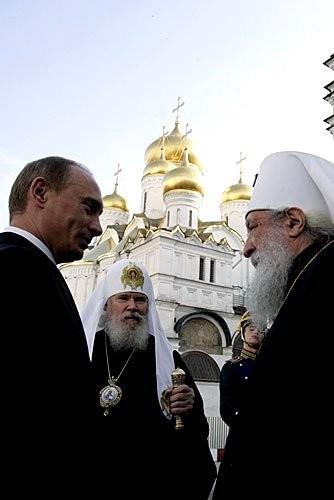
 The spread of the coronavirus in Russia has provoked a mood of apocalypticism as well as resistance to shut down orders in the Russian Orthodox Church, according to several reports. The New York Times (May 5, 2020) reports that the “clash between faith and public health has been particularly divisive in Russia, where memories of religious persecution in the Soviet Union have made priests and their flocks highly sensitive to any limits on their rituals.” The split between the Russian church and the government approaches on church shutdowns is likely to break the strong loyalty of Orthodoxy to the Putin regime. Some of Russia’s most important monasteries and religious institutions have been infested with the virus and the church has been riven by internal tensions over how to deal with the crisis. While Patriarch Kirill has urged worshippers to stay away from church services, although belatedly, he has left it up to bishops as to whether to follow these directives.
The spread of the coronavirus in Russia has provoked a mood of apocalypticism as well as resistance to shut down orders in the Russian Orthodox Church, according to several reports. The New York Times (May 5, 2020) reports that the “clash between faith and public health has been particularly divisive in Russia, where memories of religious persecution in the Soviet Union have made priests and their flocks highly sensitive to any limits on their rituals.” The split between the Russian church and the government approaches on church shutdowns is likely to break the strong loyalty of Orthodoxy to the Putin regime. Some of Russia’s most important monasteries and religious institutions have been infested with the virus and the church has been riven by internal tensions over how to deal with the crisis. While Patriarch Kirill has urged worshippers to stay away from church services, although belatedly, he has left it up to bishops as to whether to follow these directives.
This has also permitted priests to strike out against government restrictions, some of whom have made conspiratorial and apocalyptic claims about the virus or have told parishioners that they will be miraculously protected against it by faith and engaging in church rituals.
In the blog Public Orthodoxy (May 11, 2020), Regina Elsner writes that the pandemic has brought unacknowledged issues of church-state relations among church leaders and clergy to the surface. She writes that in “more quiet times, the systemic relevance of the ROC was based on saving the Russian world from the dangers of the sinful liberal society. Now, however, she finds herself in a crisis, which, for once, can be blamed on Western liberalism only to a very limited extent.” The divisions between conservative and liberal elements in the church are now visible and can no longer just be a matter of debate or papered over by leaders to foster unity. And the Russian state is no longer automatically on the side of the conservatives when it comes to public safety and the public good, Elsner argues. All this points to the fact that the church has long lacked a concept of social solidarity; “there is almost no bio- or social ethics capable of speaking either to the secular dealings with the virus or to broader questions of social justice in times of pandemic,” she concludes.
(Public Orthodoxy, https://publicorthodoxy.org/2020/05/11/russian-orthodox-church-and-coronavirus/)